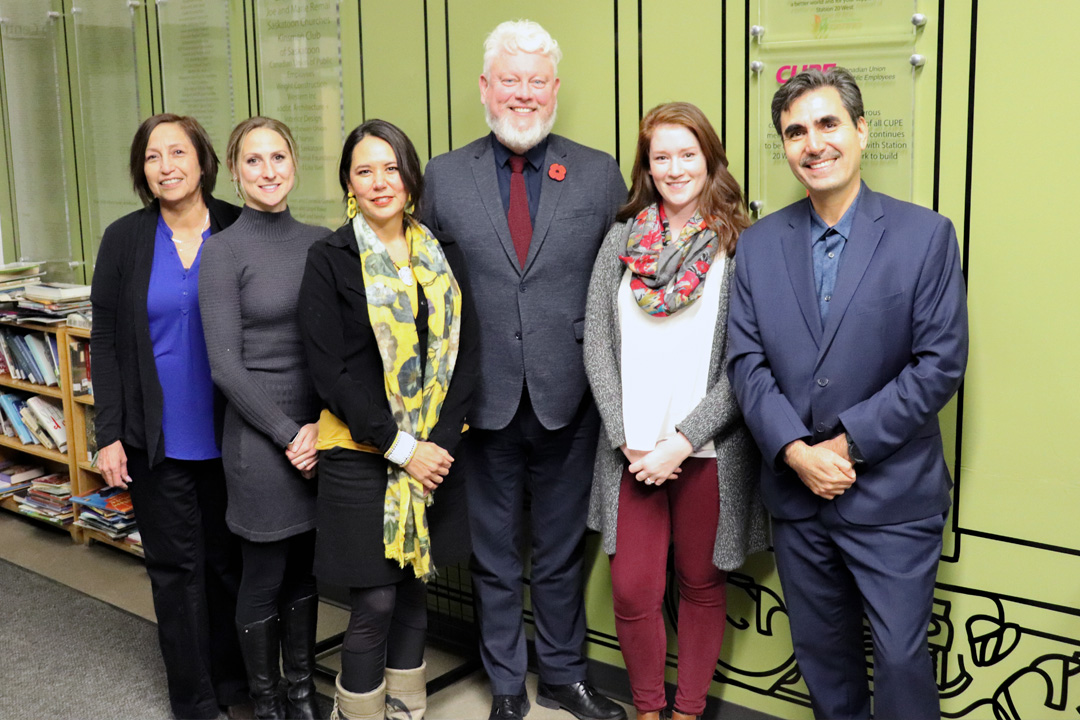
Health Sciences discussion series affirms commitment to planetary health
The USask Health Sciences Food for Thought Planetary Health Series continues to address the challenges of tackling global food security while acknowledging the delicate interdependencies of human civilization and the natural world.
By Naomi HansenOn Nov. 7, members of the Saskatoon community gathered at Station 20 West to hear an engaging presentation on nutrition transition and diabetes, hosted by the University of Saskatchewan (USask) Health Sciences. The public discussion was part of the Food for Thought Planetary Health Series, which aims to address the challenges of global food security.
“Planetary health is a way of looking at developing a sustainable approach across the globe for humans to be healthy,” said Dr. Steven M. Jones (PhD), associate provost, health. “Part of that is getting people together to hopefully improve understanding around important issues like the rising rates of diabetes.”
Two main types of diabetes affect more than 3.6 million Canadians. Approximately 90 per cent of these cases are type two diabetes. The event’s five presenters all spoke to different aspects of the issue, including dietary patterns, culture, lifestyle, and tradition.
Presenters included USask researchers Dr. Hassan Vatanparast (MD, PhD), from the College of Pharmacy and Nutrition and the School of Public Health, who spoke on obesity and nutrition patterns in newcomer and Indigenous populations; Dr. Michelle Johnson-Jennings (PhD), a land-based psychologist and Canada Research Chair in Indigenous Community-Engaged Research who talked about food as medicine in traditional Indigenous teachings; and Dr. Amanda Froehlich Chow (PhD), from the School of Public Health and College of Kinesiology, who spoke about lifestyle choices and approaching physical activity holistically.
Vatanparast noted that nutrition transition correlates directly with globalization and rising obesity rates.
“Nutrition transition is about how the way we eat has changed over time. It’s a move from traditional to modern food, including packaged and processed food,” he said.
Froehlich Chow mentioned that we are also witnessing a transition from physical activity to inactivity.
Practical examples of combating nutritional transition include gardening, finding sustainable ways of being active, learning cooking skills, and improving access to healthy food through food security.
Community partners also presented, including Dorothy Ahenakew, the Food Security Assistant for Canadian Feed the Children at Ahtahkakoop First Nation, who offered insights on community initiatives such as gardening. Amanda Kilduff, a diabetes registered dietitian with the LiveWell Chronic Disease Management team for the Saskatchewan Health Authority, also shared her experience with the Aim 4 Health diabetes clinic in Saskatoon, which offers community programs on eating well and active living.
For Kilduff, the Food for Thought event was a way to bring community and research together.
“We need to focus more on the traditional ways by looking into our culture to see what we’re missing, what we’ve lost, and what’s been taken away from us. I think we’re going to be way better off if we get back to that,” she said. “I think that’s why it’s important to get together and start asking what we want as a community. That’s what I hope the takeaway is from today, that connection.”
Johnson-Jennings echoes this sentiment, noting that our ability to adapt is key.
“We need to adapt our health interventions to suit our populations better, which includes a lot of the cultural implications of obesity and type two diabetes. We need to do this by getting back in touch with communities and understanding the world from their viewpoint. Instead of pushing western interventions, this means working with communities as co-researchers and honouring ancestral wisdom and traditional ways of health to develop interventions.”
The Food for Thought series grew out of a conference that the university hosted in March 2019 to focus on planetary health and the United Nations Sustainable Development Goals (SDGs). Past monthly events have included discussions on solutions for global health problems, food systems beyond nutrition, and a meeting with university experts and industry leaders on planetary health and the beef industry.
Next up in the series is a free screening on Dec. 6 of the documentary Just Eat It, which looks at the issue of food waste on a national and global scale. The screening, which is open to the public and school groups, is being presented through a partnership between the USask Health Sciences and the College of Education.
Jones notes that the Food for Thought series is important for broadening the university’s reach.
“As we endeavour to become the university that the world needs, it’s important that we actually meet people where they’re at and hold events like this outside of our campus. It’s also important for us to address issues that are important to the community through conversation.”
For more information on the Food for Thought Planetary Health Series presented by the University of Saskatchewan Health Sciences, visit https://healthsciences.usask.ca/planetary-health/the-usask-food-for-thought-planetary-health-series.php

